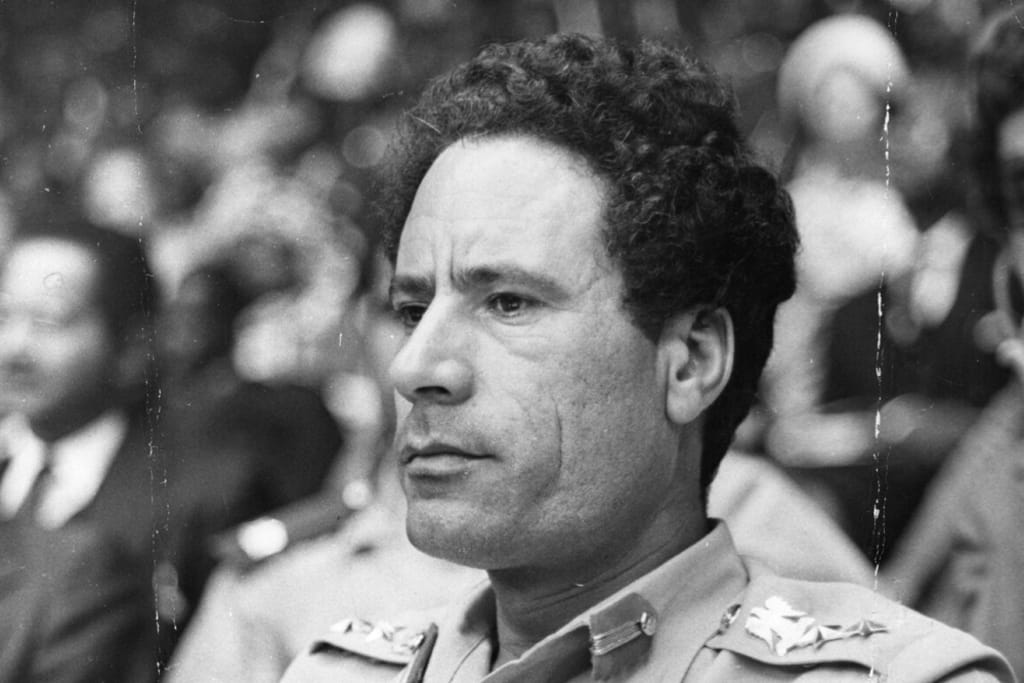
Muammar Muhammad Abu Minyar al-Gaddafi, commonly known as Colonel Gaddafi, was a Libyan politician and revolutionary who was the de facto ruler of Libya from 1969 until his downfall in 2011. Born on June 7, 1942, in a desert tent near Sirte, Gaddafi rose to power as the leader of the 1969 military coup that overthrew King Idris and established the Libyan Arab Republic.
Early Life and Education:
Gaddafi was born to a Bedouin family of the Qadhadhfa tribe, which lived in a tent in the desert near Sirte. His father, Abu Meniar, was a herder and his mother, Aisha, was illiterate. Gaddafi attended primary school in Sirte and then went on to secondary school in Sebha, a town in the southern part of Libya. He excelled in his studies, particularly in Arabic and Islamic studies, and was known for his strong personality.
In 1961, Gaddafi was sent to Benghazi to study law at the University of Libya. He became involved in politics and joined the Muslim Brotherhood, a fundamentalist Islamic group. He was also influenced by the revolutionary ideas of Gamal Abdel Nasser, the Egyptian president who had come to power in a military coup in 1952.
Rise to Power:
In 1969, Gaddafi and a group of army officers led a bloodless coup against King Idris, who was seen as corrupt and out of touch with the needs of the Libyan people. Gaddafi was just 27 years old at the time, but he quickly established himself as the leader of the new government. He declared himself the "Brother Leader" of the Libyan Arab Republic and began to implement his own version of socialism, which he called the "Third Universal Theory."
Gaddafi's government nationalized the oil industry and other key sectors of the economy, and he used the country's oil wealth to fund ambitious social programs, such as free healthcare and education for all Libyans. He also supported revolutionary movements in other countries, such as the African National Congress in South Africa and the Irish Republican Army.
Gaddafi's Libya was a one-party state, with the Libyan Arab Socialist Union (LASU) serving as the sole political party. Gaddafi saw LASU as a vehicle for the implementation of his socialist policies, and he used it to control all aspects of Libyan society, including the media, education, and the legal system.
International Relations:
Gaddafi was known for his confrontational approach to international relations. He openly supported terrorist organizations, such as the Palestine Liberation Organization (PLO), and he was accused of sponsoring terrorist attacks in Europe and Africa. In 1986, the United States bombed Libya in retaliation for a terrorist attack on a Berlin nightclub that was believed to have been carried out by Libyan agents.
Despite his controversial foreign policy, Gaddafi remained popular among many Libyans. He was seen as a champion of Arab and African unity and a defender of the rights of developing countries.
Downfall:
In 2011, a wave of protests swept across the Arab world, and Libya was not immune to the unrest. Anti-government demonstrations broke out in Benghazi, and Gaddafi responded with a brutal crackdown. The situation quickly escalated into a full-blown civil war, with rebel forces taking control of much of the country.
In March 2011, a coalition of NATO countries launched a military intervention in Libya to protect civilians and help the rebel forces. Gaddafi's forces were eventually defeated, and he was forced to flee the capital, Tripoli.
Gaddafi went into hiding, but he was eventually captured by rebel forces in October 2011.
Gaddafi's capture marked the end of his rule in Libya, and he was soon after killed by rebel forces in circumstances that remain controversial. His death brought an end to over four decades of authoritarian rule and marked a significant turning point in the country's history.
Despite his controversial legacy, Gaddafi was a complex figure who left a lasting impact on Libya and the wider world. He was known for his flamboyant style, eccentric behavior, and grandiose visions for the future. He saw himself as a revolutionary and a champion of the downtrodden, but his policies and actions were often divisive and controversial.
Throughout his rule, Gaddafi was known for his fiery speeches and his willingness to confront his critics. He often portrayed himself as a leader who was not afraid to challenge the status quo, and he was not afraid to make enemies in the process.
Gaddafi's legacy remains a subject of debate in Libya and around the world. Some see him as a hero who stood up to Western imperialism and championed the cause of the oppressed, while others view him as a brutal dictator who used violence and repression to maintain his grip on power.
Regardless of one's views on Gaddafi, it is clear that his rule left a lasting impact on Libya and the wider world. His legacy will continue to be debated and analyzed for years to come, as historians and analysts seek to understand the complex forces that shaped his life and his rule.
About the Creator
Abli
"People write because no one listens"
Enjoyed the story? Support the Creator.
Subscribe for free to receive all their stories in your feed. You could also pledge your support or give them a one-off tip, letting them know you appreciate their work.






Comments
There are no comments for this story
Be the first to respond and start the conversation.